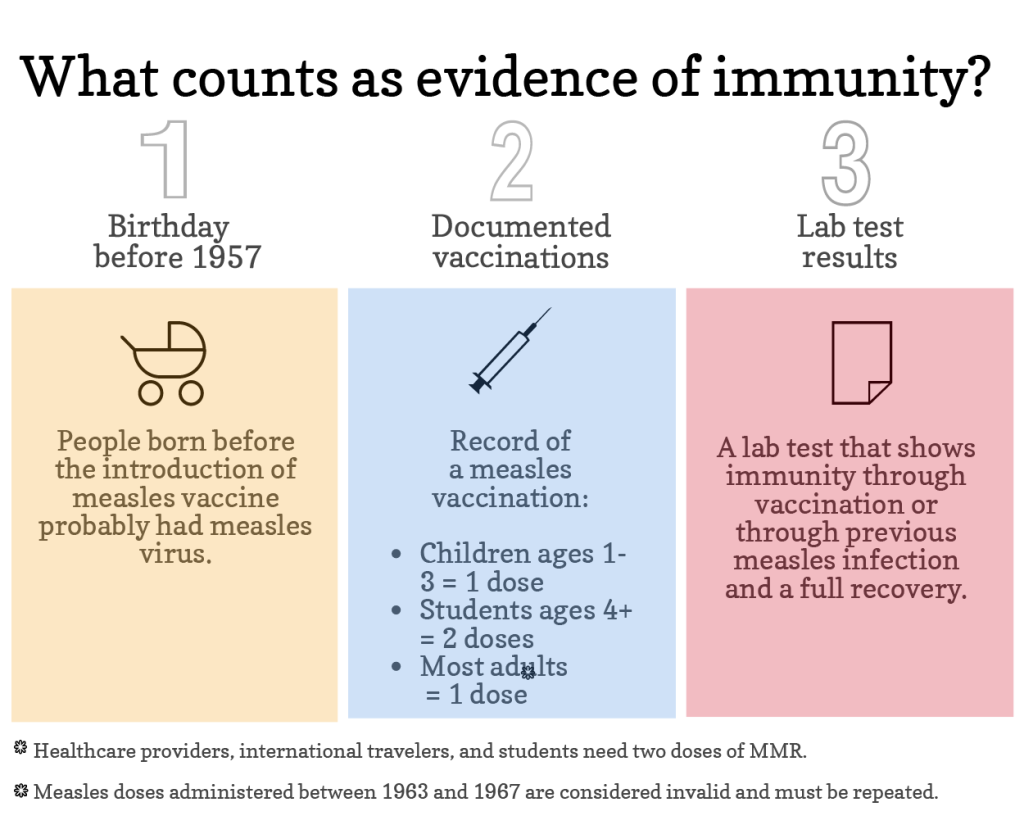Public Health Insider – Public Health — Seattle & King County
Public Health was informed by Washington State Department of Health last week that a group of international travelers visiting Seattle were exposed to an individual with measles prior to arriving in Seattle. Currently, there are no cases of measles among the group (or within King County), but we are monitoring the situation closely.
In situations like these, our public health teams act quickly to help prevent the spread of measles and connect people to healthcare if needed. Public Health investigators tested the individuals in the traveling group for measles immunity and provided instructions on how to watch for symptoms for 21 days after the exposure to measles. Thirteen travelers did not have evidence of measles immunity, and those individuals are currently supported by Public Health to prevent the potential for spread while they remain here locally. At this time, we aren’t aware of exposures to the general public.
“While thankfully no one has become ill with measles yet, this could change. Our teams are keeping a very close eye on the situation,” said Dr. Eric Chow, Chief of Communicable Disease for Public Health – Seattle & King County. “Measles is highly contagious, so any time there is an exposure, it’s an important reminder of why getting the measles vaccine is so necessary to protect one another.”
Information on measles is available in 23 languages below and on our measles webpage
አማርኛ (Amharic), العربية (Arabic), မြန်မာဘာသာ (Burmese), 简体字 (Chinese, Sim.), 繁體字 (Chinese, Trad.), دری (Dari), English, Français (French), हिन्दी (Hindi), ភាសាខ្មែរ (Khmer), 한국어 (Korean), Kajin M̧ajeļ (Marshallese) , नेपाली (Nepali) , پښتو (Pashto), Português (Portuguese), Русский (Russian), Af Soomaali (Somali), Español (Spanish), Kiswahili (Swahili), Wikang Tagalog/Filipino (Tagalog/Filipino), ትግርኛ (Tigrinya), Українська (Ukrainian), Tiếng Việt (Vietnamese)
Why we’re concerned about measles
Measles was declared eliminated in the U.S. almost 25 years ago when vaccination rates were high, so many of us don’t remember a time when measles was a regular, daily threat. But in the U.S. and around the world, there’s been a dramatic drop in childhood measles vaccination rates. The drop is likely due to difficulties accessing health care during the COVID-19 pandemic, multiple humanitarian crises across the globe, and growing vaccine hesitancy.
Measles is a serious disease that causes a rash and fever. Measles can lead to serious health complications such as pneumonia, hearing loss, brain damage, and even death. Individuals who are not vaccinated are at greatest risk for infection and serious illness. In fact, about 1 in 5 unvaccinated people with measles are hospitalized.
In King County, we are far below the protection we need to prevent spread: only 86% of younger children (19-35 month olds) and 75% of 4-6 year olds are up to date on MMR vaccine (as of March, 2024).
Measles can spread quickly in communities where vaccination rates are lower than 95%. A high level of vaccination is needed to protect people who can’t get the vaccine such as individuals who have compromised immune systems and babies under one year old.

How to protect against measles
Measles is preventable and vaccination is the best protection against the virus. Once children get the two recommended doses of the vaccine, they will be protected against measles for their lifetime.
“The MMR shot is safe and very effective at preventing measles. When you take steps to ensure that you and your children get the recommended measles vaccines, you aren’t only protecting your child and family, you are helping protect our whole community,” said Dr. Eric Chow, Chief of Communicable Disease, Public Health – Seattle & King County.
If you or your child has not been vaccinated, it’s not too late! Contact your health care provider or pharmacy. Need assistance finding a provider or enrolling in health insurance? Call the Community Health Access Program (CHAP): 206-284-0331 or email chap@kingcounty.gov.
More information about measles is available on our Public Health website.


